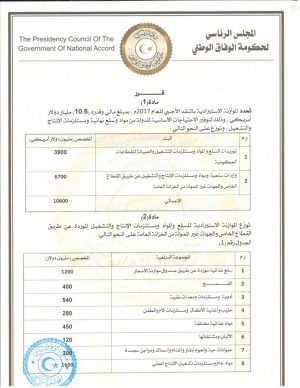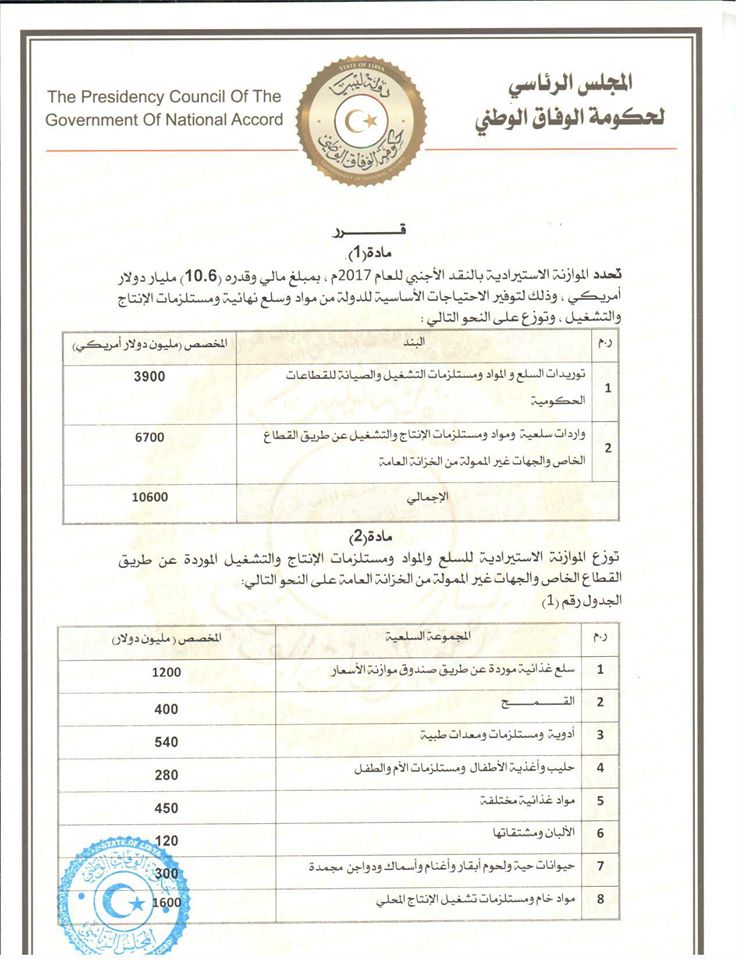By Sami Zaptia.

London, 27 April 2017:
The Faiez Serraj-led Presidency Council / Government of National Accord (PC/GNA) passed a decree this week allocating US$ 10.6 bn for Libya’s total 2017 import budget.
The hard currency budget would be sold to the importer at the official Central Bank of Libya foreign exchange rate of LD 1.4 to the dollar. The budget is for both finished products and raw materials and equipment for production and industry.
The private sector is allocated the lion’s share of the import budget of US$ 6.7 bn whilst the state sector is allocated US$ 3.9 bn.
| Description | Amount in US$ bn | |
| 1 | Products, equipment raw materials for state sector | 3.9 |
| 2 | Products, equipment raw materials for private sector | 6.7 |
| Total | 10.6 |
Within the private sector total allocation, the biggest chunk of money is given to raw materials and local production needs at US$ 1.6 bn. Within that, food production receives US$ 500 million, followed by animal feed production (US$ 420 m) and iron and steel production (US$ 400 m).
The food Price Stabilization Fund is allocated US$ 1.2 bn. This fund imports basic foods such as flour, rice, pasta, cooking oil and sells them into the market at a subsidized price. Medicines and health needs receive US$ 540 million, various food imports get US$ 450 m, wheat imports US$ 400 m and livestock and frozen foods receive US$ 300 million.
| Private sector dollar import allocations 2017 | ||
| Description | Amount US $ | |
| 1 | Foodstuffs imported through Price Stabilization Fund | 1.2 bn |
| 2 | Medicines and health needs | 540 million |
| 3 | Various food products | 450 m |
| 4 | Wheat | 400 m |
| 5 | Livestock and frozen meats | 300 m |
| 6 | Baby milk and foods and mother and child needs | 280 m |
| 7 | Dairy products | 120 m |
| 8 | Raw materials & equipment for local production | 1,600 bn |
The Serraj government has also allocated for the private sector US$ 500 million for domestic food production, US$ 420 m for animal feed production and US$ 400 m for iron and steel production.
| Private sector dollar import allocations 2017 | ||
| Raw materials & equipment for local production: details | US $ | |
| 8.1 | Food production sector | 500 m |
| 8.2 | Animal feed production sector | 420 m |
| 8.3 | Iron and steel production sector | 400 m |
| 8.4 | Cement and building materials sector | 160 m |
| 8.5 | Other sectors | 120 m |
| Total | 1.6 bn |
The internationally recognized Faiez Serraj government has allocated for the private sector US$ 340 million for clothes and shoes imports, US$ 260 m for household electrical goods and US$ 180 m for cement and paint products.
| Private sector dollar import allocations 2017 | US $ | |
| 9 | Clothes and shoes | 340 |
| 10 | Household electric goods | 260 |
| 11 | Reserve cover set aside for other needs | 200 |
| 12 | Cement & paint products | 180 |
| 13 | Fertilizers, seeds & agricultural products | 140 |
| 14 | Finished animal feed | 120 |
| 15 | Electrical goods | 120 |
| 16 | Car and HGV spare parts | 120 |
| 17 | Cleaning materials | 100 |
| 18 | Veterinary needs | 100 |
| 19 | Stationery and school needs | 70 |
| 20 | Tyres & batteries | 60 |
| Total | 6.7 bn |
For the state sector, the important oil and gas sector is allocated US$ 1.2 bn to maintain, repair, upgrade and increase oil production. The politically sensitive electricity sector is allocated US$ 700 m in an effort to keep electricity production going and an attempt to curtail the debilitating power cuts.
The state Medical Supply Organization (MSO) is allocated US$ 500 m to import medicines and the everyday running needs of state clinics and hospitals for the crumbling (according to WHO reports) state health sector. There is also another US$ 280 m specifically for medical equipment.
The Man-made River, supplying Libya’s drinking water from aquifers located in the country’s deep south is allocated US$ 130 m and the water and sanitation sector is also given a similar amount.
The security and military sector is allocated US$ 300 m in an effort for the Libyan state to rebuild its collapsed state security apparatus.
| State sector dollar import allocations 2017 | ||
| Description | US $ | |
| 1 | Oil and gas sector needs | 1.2 bn |
| 2 | Electricity sector needs | 700 m |
| 3 | Medical Supply Organization | 500 m |
| 4 | Reserve cover for state sector needs | 380 m |
| 5 | Security & military needs | 300 m |
| 6 | Equipment for (human) medical needs | 280 m |
| 7 | Man-mad River needs | 130 m |
| 8 | Water and sanitation needs | 130 m |
| 9 | Transport sector | 120 m |
| 10 | Social care & special needs sector | 80 m |
| 11 | IT and Telecommunications | 80 m |
| Total | 3.9 bn |
The decree also creates two committees, one for the state sector and one for the private sector, to monitor the process. They are headed by the Minister for Economy and they are tasked with overseeing the equal distribution of dollar allocations to all banks.
The decree also prescribes that a published database is created of all companies receiving dollar allocations showing the products they import and the approximate prices they should charge.
The decree also imposes price restrictions and distribution conditions. Companies breaking these conditions can be blacklisted and barred from receiving any further dollar allocations.
It must be noted that the Libyan business community is unhappy that the Serraj government has failed to consult them on the make-up and amounts allocated in this decree. The chairman of the Libyan Businessmen Council, Abdalla Fellah stated that the LBC was not consulted even on the make-up of the monitoring committees which he complained did not have adequate private sector representation on it.










